高中英语3
高中英语必修三知识点总结(详细版)
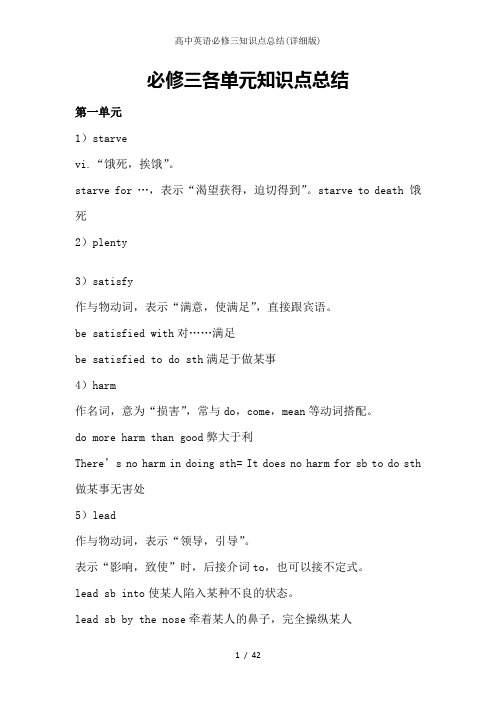
必修三各单元知识点总结第一单元1)starvevi.“饿死,挨饿”。
starve for …,表示“渴望获得,迫切得到”。
starve to death 饿死2)plenty3)satisfy作与物动词,表示“满意,使满足”,直接跟宾语。
be satisfied with对……满足be satisfied to do sth满足于做某事4)harm作名词,意为“损害”,常与do,come,mean等动词搭配。
do more harm than good弊大于利There’s no harm in doing sth= It does no harm for sb to do sth 做某事无害处5)lead作与物动词,表示“领导,引导”。
表示“影响,致使”时,后接介词to,也可以接不定式。
lead sb into使某人陷入某种不良的状态。
lead sb by the nose牵着某人的鼻子,完全操纵某人lead a dog’s life过困难的生活lead the way带路,带头lead to 导致,致使6)origin是名词,表示“起源,起因,出身”。
be of origin起源于,出身于7)event是名词,表示“事变,事件”,既可以指历史上的,国际上的,国内的大事件,也可以指日常事件,复数形式还可以指事态的发展和结局。
也可以指体育比赛中的“项目”。
常见词组:at all events/in every event总之,无论如何,不管怎样in the event结果,终于 in the event of万一,如果,倘若 in that event若果那样的话8)dress作与物动词,表示“给……穿衣”,后接人作宾语,也可以做不与物动词,表示“穿上衣服,穿着衣服”。
dress up穿上盛装,打扮dress作不可数名词,表示“衣服”;作可数名词,表示“妇女与儿童的衣服”。
dress sth up修饰,掩饰9)trickplay a trick on sb=play sb a trick开某人的玩笑,诈骗某人do/turn the trick达到(预期的)目的,获得成功。
人教版高中英语必修三(Book 3 Unit 3)
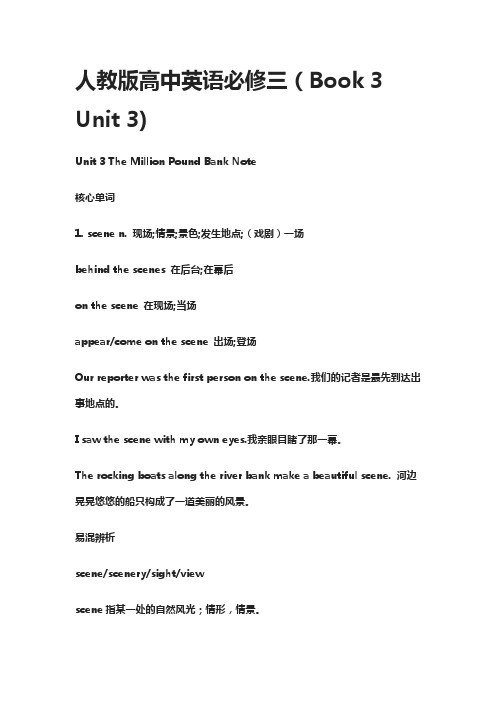
人教版高中英语必修三(Book 3 Unit 3)Unit 3 The Million Pound Bank Note核心单词1. scene n. 现场;情景;景色;发生地点;(戏剧)一场behind the scenes 在后台;在幕后on the scene 在现场;当场appear/come on the scene 出场;登场Our reporter was the first person on the scene.我们的记者是最先到达出事地点的。
I saw the scene with my own eyes.我亲眼目睹了那一幕。
The rocking boats along the river bank make a beautiful scene. 河边晃晃悠悠的船只构成了一道美丽的风景。
易混辨析scene/scenery/sight/viewscene指某一处的自然风光;情形,情景。
scenery(总称)自然景物,天然风光,是由多个scenes构成的自然风景。
sight景象,风景,名胜,侧重指值得看的事物或很难看的东西;很可笑的事物。
view景色,风景,侧重指从人所处的角度用肉眼所看到的景色。
【活学活用】(1)A new chapter in a novel is something like a new scene in a play. 一部小说中新的一章就像一出戏中新的一场。
(2)Tears poured forth as she watched the sad scene.她一看到这悲惨的场景,便禁不住流下泪来。
(3)It is the first time that I have seen such a beautiful scene.这是我第一次看到这样美丽的景色。
(4)The hall was full of fans before the star _______________. 在这个明星出场之前,大厅里挤满了他的支持者。
人教版高中英语必修3课文翻译
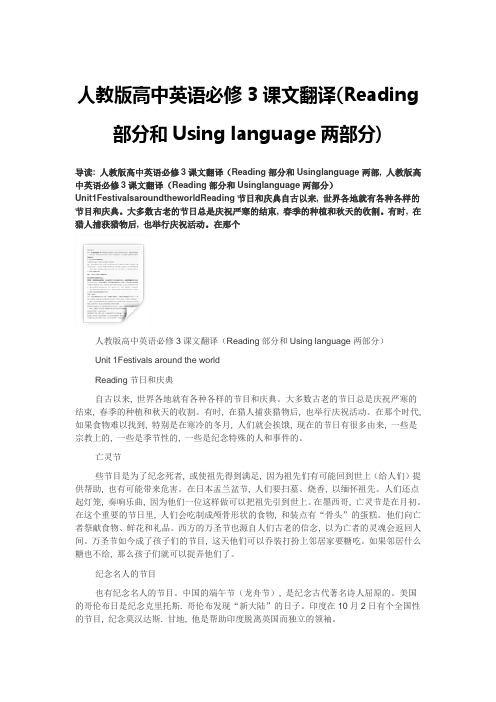
人教版高中英语必修3课文翻译(Reading 部分和Using language两部分)导读: 人教版高中英语必修3课文翻译(Reading部分和Usinglanguage两部, 人教版高中英语必修3课文翻译(Reading部分和Usinglanguage两部分)Unit1FestivalsaroundtheworldReading节日和庆典自古以来, 世界各地就有各种各样的节目和庆典。
大多数古老的节日总是庆祝严寒的结束, 春季的种植和秋天的收割。
有时, 在猎人捕获猎物后, 也举行庆祝活动。
在那个人教版高中英语必修3课文翻译(Reading部分和Using language两部分)Unit 1Festivals around the worldReading节日和庆典自古以来, 世界各地就有各种各样的节目和庆典。
大多数古老的节日总是庆祝严寒的结束, 春季的种植和秋天的收割。
有时, 在猎人捕获猎物后, 也举行庆祝活动。
在那个时代, 如果食物难以找到, 特别是在寒冷的冬月, 人们就会挨饿, 现在的节日有很多由来, 一些是宗教上的, 一些是季节性的, 一些是纪念特殊的人和事件的。
亡灵节些节目是为了纪念死者, 或使祖先得到满足, 因为祖先们有可能回到世上(给人们)提供帮助, 也有可能带来危害。
在日本盂兰盆节, 人们要扫墓、烧香, 以缅怀祖先。
人们还点起灯笼, 奏响乐曲, 因为他们一位这样做可以把祖先引到世上。
在墨西哥, 亡灵节是在月初。
在这个重要的节日里, 人们会吃制成颅骨形状的食物, 和装点有“骨头”的蛋糕。
他们向亡者祭献食物、鲜花和礼品。
西方的万圣节也源自人们古老的信念, 以为亡者的灵魂会返回人间。
万圣节如今成了孩子们的节目, 这天他们可以乔装打扮上邻居家要糖吃。
如果邻居什么糖也不给, 那么孩子们就可以捉弄他们了。
纪念名人的节目也有纪念名人的节目。
中国的端午节(龙舟节), 是纪念古代著名诗人屈原的。
人教版高中英语必修三Unit3全课件
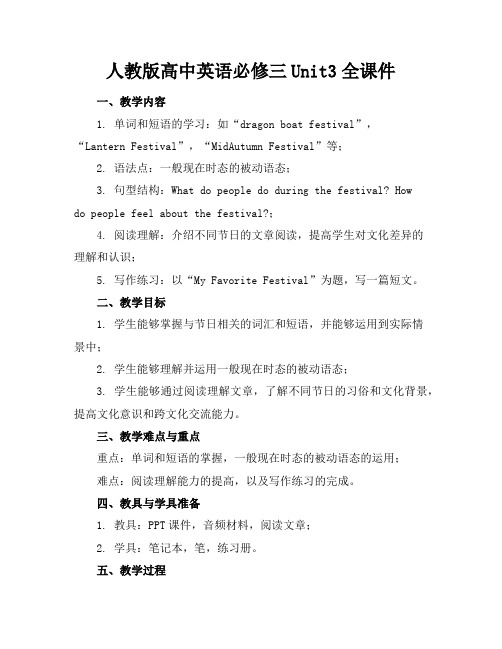
人教版高中英语必修三Unit3全课件一、教学内容1. 单词和短语的学习:如“dragon boat festival”,“Lantern Festival”,“MidAutumn Festival”等;2. 语法点:一般现在时态的被动语态;3. 句型结构:What do people do during the festival? Howdo people feel about the festival?;4. 阅读理解:介绍不同节日的文章阅读,提高学生对文化差异的理解和认识;5. 写作练习:以“My Favorite Festival”为题,写一篇短文。
二、教学目标1. 学生能够掌握与节日相关的词汇和短语,并能够运用到实际情景中;2. 学生能够理解并运用一般现在时态的被动语态;3. 学生能够通过阅读理解文章,了解不同节日的习俗和文化背景,提高文化意识和跨文化交流能力。
三、教学难点与重点重点:单词和短语的掌握,一般现在时态的被动语态的运用;难点:阅读理解能力的提高,以及写作练习的完成。
四、教具与学具准备1. 教具:PPT课件,音频材料,阅读文章;2. 学具:笔记本,笔,练习册。
五、教学过程1. 情景引入:通过播放音频材料,引导学生听懂并模仿音频中的节日场景,激发学生对节日的兴趣;2. 新课内容展示:教师通过PPT课件,展示与节日相关的词汇和短语,引导学生学习并掌握;3. 阅读理解:教师分发阅读文章,指导学生进行阅读理解,通过提问的方式检查学生的理解程度;4. 语法讲解与练习:教师讲解一般现在时态的被动语态,并通过例句和练习题让学生进行实际操作;5. 小组活动:学生分组讨论,分享自己喜欢的节日,并运用所学词汇和短语进行表达;6. 写作练习:教师布置写作任务,学生以“My Favorite Festival”为题,进行短文写作;六、板书设计1. 节日词汇和短语的列表;2. 一般现在时态的被动语态的句型结构;3. 阅读理解文章的关键词汇;4. 写作练习的要求和评分标准。
人教版高中英语必修三Unit3全课件

5.intelligence [U] n. 智力,才智;消息,情报 搭配: have the intelligence to do sth 有做某事的智 慧 eg: He didn’t even have the intelligence to call for an ambulance. intelligent adj.聪明的 6.from…on 从某时开始,从某时以后 from then/that time on 从那时起,一般用:”一般过去 时 from now on 从现在起,一般用:“一般将来时 I will study hard from now on. I remebered her words from then on.
18.watch over (1)看管,照顾 eg: Will you watch over my clothes while I have a swim. (2)看守,监视,守卫,保护 eg: They were watched over by three policemen. watch out 注意,留神 keep a watch on 监视
4.artificial adj. (1)人工的,人造的,假的 eg: artificial intelligence 人工智能 (2)人为的,非自然的 eg: A job interview is a very artificial situation. (3)虚假的,假装的 eg: artificial emotion 假装的感情
6.Result n./v.结果,发生,产生作用或结果 As a/the result 最终,结果(插入语或句首) He is very handsome. As a result,many girls fall in love with him. He didn’t work hard, as a result, he was dismissed. As a/the result of (=because of )由于(+n/ving,做原因状语, 可放在句中或句首) As a result of/Because of the weather, all the crops grow well. They were punished as a result of cutting trees without permission. Result in 导致(结果) result from 由于(原因,谓语) The company resulted in failure. The traffic jam results from bad weather.
高中英语必修3(人教版)
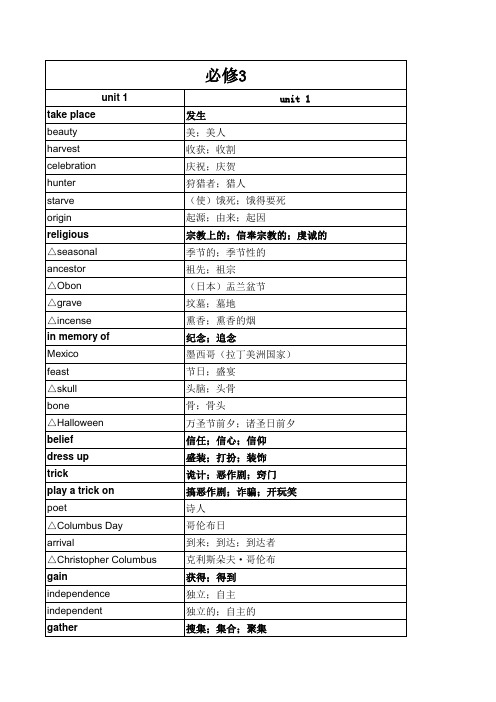
unit2 diet △spaghetti nut △muscle △protective bean pea cucumber eggplant pepper 日常饮食 节食 意大利式细面条 坚果;果仁 肌肉;(食用)瘦肉 给予保护的;保护的 豆;豆科植物 豌豆 黄瓜 茄子 辣椒;辣椒粉
unit2
mushroom peach lemon balance balanced diet barbecue mutton △kebab roast △stir fry stir-fry ought ought to bacon △cola △sugary △sign lose weight slim curiosity hostess raw vinegar get away with lie tell a lie customer discount win…back weakness strength consult
高中英语必修3人教版人教版英语必修四人教版英语必修1人教版英语必修三人教版高中必修一人教版高中数学必修人教版高中历史必
必修3 必修3
unit 1 take place beauty harvest celebration hunter starve origin religious △seasonal ancestor △Obon △grave △incense in memory of Mexico feast △skull bone △Halloween belief dress up trick play a trick on poet △Columbus Day arrival △Christopher Columbus gain independence independent gather 发生 美;美人 收获;收割 庆祝;庆贺 狩猎者;猎人 (使)饿死;饿得要死 起源;由来;起因 宗教上的;信奉宗教的; 宗教上的;信奉宗教的;虔诚的 季节的;季节性的 祖先;祖宗 (日本)盂兰盆节 坟墓;墓地 熏香;熏香的烟 纪念; 纪念;追念 墨西哥(拉丁美洲国家) 节日;盛宴 头脑;头骨 骨;骨头 万圣节前夕;诸圣日前夕 信任;信心; 信任;信心;信仰 盛装;打扮; 盛装;打扮;装饰 诡计;恶作剧; 诡计;恶作剧;窍门 搞恶作剧;诈骗; 搞恶作剧;诈骗;开玩笑 诗人 哥伦布日 到来;到达;到达者 克利斯朵夫·哥伦布 获得; 获得;得到 独立;自主 独立的;自主的 搜集;集合; 搜集;集合;聚集 unit 1
人教版高中英语必修3重点词汇、短语、句型、语法大全
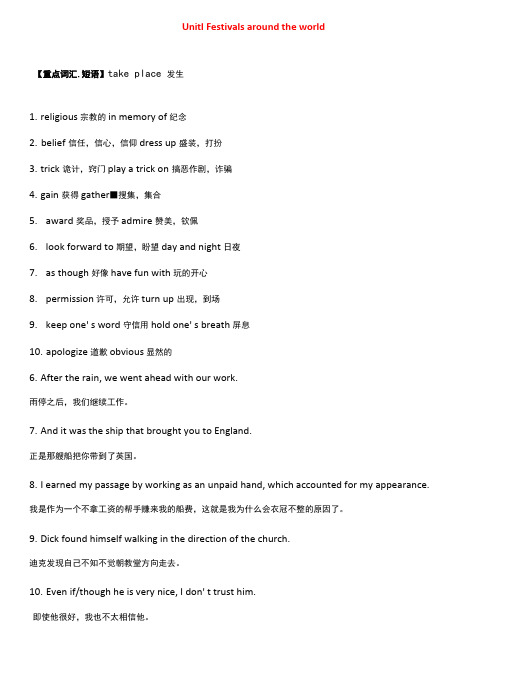
Unitl Festivals around the world【重点词汇.短语】take place 发生1.religious 宗教的in memory of 纪念2.belief信任,信心,信仰dress up盛装,打扮3.trick诡计,窍门play a trick on搞恶作剧,诈骗4.gain获得gather■搜集,集合5.award奖品,授予admire赞美,钦佩6.look forward to 期望,盼望day and night 日夜7.as though 好像have fun with 玩的开心8.permission 许可,允许turn up出现,到场9.keep one' s word 守信用hold one' s breath 屏息10.apologize 道歉obvious 显然的6.After the rain, we went ahead with our work.雨停之后,我们继续工作。
7.And it was the ship that brought you to England.正是那艘船把你带到了英国。
8.I earned my passage by working as an unpaid hand, which accounted for my appearance. 我是作为一个不拿工资的帮手赚来我的船费,这就是我为什么会衣冠不整的原因了。
9.Dick found himself walking in the direction of the church.迪克发现自己不知不觉朝教堂方向走去。
10.Even if/though he is very nice, I don' t trust him.即使他很好,我也不太相信他。
【语法总结】名词性从句在句子中起名词作用的句子叫名词性从句(Noun Clauses),名词性从句的功能相当于名词词组,它在复合句中能担任主语、宾语、表语、同位语等,因此根据它在句中不同的语法功能,名词性从句又可分别称为主语从句、宾语从句、表语从句和同位语从句。
(完整版)高中英语必修三-课文详解Book3-unit2
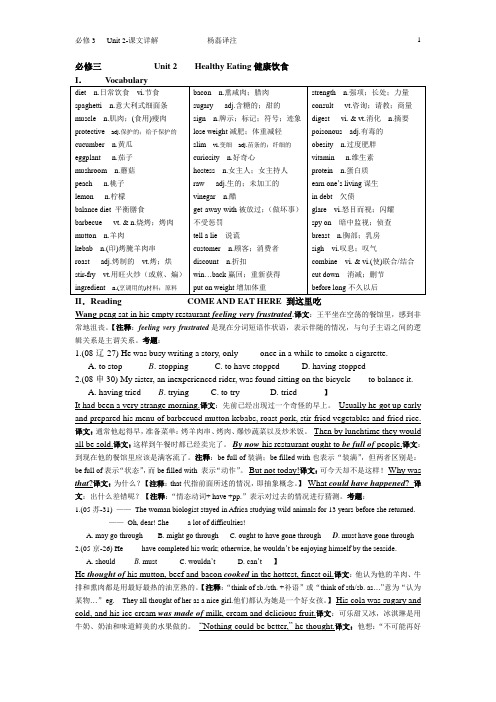
必修三Unit 2 Healthy Eating健康饮食II.Reading COME AND EAT HERE 到这里吃Wang peng sat in his empty restaurant feeling very frustrated.译文:王平坐在空荡的餐馆里,感到非常地沮丧。
【注释:feeling very frustrated是现在分词短语作状语,表示伴随的情况,与句子主语之间的逻辑关系是主谓关系。
考题:1.(08辽-27) He was busy writing a story, only ____ once in a while to smoke a cigarette.A. to stopB. stoppingC. to have stoppedD. having stopped2.(08申30) My sister, an inexperienced rider, was found sitting on the bicycle ___ to balance it.A. having triedB. tryingC. to tryD. tried 】It had been a very strange morning.译文:先前已经出现过一个奇怪的早上。
Usually he got up early and prepared his menu of barbecued mutton kebabs, roast pork, stir-fried vegetables and fried rice.译文:通常他起得早,准备菜单:烤羊肉串、烤肉、爆炒蔬菜以及炒米饭。
Then by lunchtime they would all be sold.译文:这样到午餐时都已经卖完了。
By now his restaurant ought to be full of people.译文:到现在他的餐馆里应该是满客流了。
- 1、下载文档前请自行甄别文档内容的完整性,平台不提供额外的编辑、内容补充、找答案等附加服务。
- 2、"仅部分预览"的文档,不可在线预览部分如存在完整性等问题,可反馈申请退款(可完整预览的文档不适用该条件!)。
- 3、如文档侵犯您的权益,请联系客服反馈,我们会尽快为您处理(人工客服工作时间:9:00-18:30)。
高中一年级英语上册期中模块考试试题英语试题(必修一)时间:100分钟满分:100分第一部分部分听力(共两节,满分15分)第一节(共5小题;每小题0.75分,满分3.75分) 听下面5段对话......高中一年级英语上册期中模块考试试题英语试题(必修一)时间:100分钟满分:100分第一部分部分听力(共两节,满分15分)第一节(共5小题;每小题0.75分,满分3.75分)听下面5段对话。
每段对话后有一个小题,从题中所给的A、B、C三个选项中选出最佳选项。
听完每段对话后,你都有10秒钟的时间来回答有关小题和阅读下一小题。
每段对话仅读一遍。
1.What will they do?A.Hold a party.B.Go shopping.C.Meet father.2.What can help the girl sleep well?A.Some sleeping medicine.B.A glass of milk.C.Mother‟s help.3.Where will the man most probably stay?A.In a tent.B.In his friend‟s home.C.In a hotel with some equipment(设备).4.Where are they going for the weekend?A.To the river.B.To the seaside.C.To the place far from the sea.5.What is the possible relationship between the two speakers?A.Teacher and student.B.Clerk and boss.C.Friends.第二节(共15小题;每小题0.75分,满分11.25分)听下面5段对话或独白。
每段对话或独白后有几个小题,从题中所给的A、B、C三个选项中选出最佳选项。
听每段对话或独白前,你将有时间阅读各个小题,每小题5秒钟;听完后,各小题将给出5秒钟的作答时间。
每段对话或独白读两遍。
听第6段材料,回答第6至8题6.Who is Steven?A.The woman‟s husband.B.Mrs. White‟s son.C.The woman‟s uncl e.7.When did Steven hurt himself?A.Last week.B.This week.C.A month ago.8.What part of the body did Steven hurt?A.His leg.B.His heart.C.His hand.听第7段材料,回答第9至11题9.Why couldn‟t the boy speak at first?A.Because something was wrong with him.B.Becaus e he wouldn‟t talk with strangers.C.Because he was too hungry to speak.10.Where is the boy from?A.He‟s from San Francisco.B.He‟s from Florida.C.He‟s from Tangs A.11.What was the boy going to do?A.He was going to find some food.B.He was going to visit his grandpa.C.He was going to clean the plate.听第8段材料,回答第12至14题12.Why is Stella unhappy?A.She cannot sleep all whole nights.B.She had a quarrel with her neighbour.C.She was misunderstood by her friend.13.Who is Mr. Philips?A.Stella‟s friend.B.St ella‟s husband.C.Stella‟s neighbour.14.Who made the woman not sleep well?A.The milkman.B.Mr. Philips.C.Mr. Bill.听第9段材料,回答第15至17题15.What happened to the man‟s mother?A.She has just recovered(恢复).B.She is too old to walk.C.She had an operation.16.How soon will the man come back to his job?A.In more than a week.B.In less than 7 days.C.He doesn‟t know.17.What‟s the relationship between the two speakers?A.Doctor and patient.B.Colleagues(同事).C.Relatives(亲戚).听第10段材料,回答第18至20题18.Where do you suppose John lived?A.In the northeast of England.B.In London.C.In the southwest of England.19.How many people were there in John‟s car when the man with a gun came in?A.The car was full.B.Only five people were there.C.He was alone in the car.20.Why was John shaking before the man with a gun?A.He was afraid of the gun.B.He was afraid of the ticket-collector.C.He was afraid of being robbed.第二部分英语知识应用(共两节,满分35分)第一节语法和词汇知识(共15小题;每小题1分,满分15分)从A、B、C、D四个选项中,选出可以填入空白处的最佳选项,并在答题卡上将该项涂黑。
21.Zhouzhuang is really a fantastic old town with a lot of beautiful __________.A.description B.architecture C.souvenir D.invention 22.Although against my opinion, the old professor sitting next to me didn't _______ hisown one.A.come up with B.put up with C.catch up with D.keep up with23.___________ with the others, you have made the greatest progress in English so far.A.Comparing B.Compared C.To compare D.Compare24.—Are you pleased with his performance?—Well done! It couldn't have been _______.A.better B.worse C.so bad D.he worst25.—Who do you think I should ask for help when I am in trouble?—__________.A.It‟s up to you B.That‟s settled C.That‟s it D.You got it 26.All of us have been looking forward _________ from our former teacher.A.to hear B.to hearing C.hearing D.hear27.Mr. Green _________ goes to the park for a walk with some friends after supper.A.frequently B.immediately C.completely D.finally28.I‟d appreciate____________ if you show me how to use the new toy.A.you B.that C.this D.it29.Although K ate tried to avoid ___________ John, the naughty boy, yet she didn‟t.A.meet B.meeting C.to meet D.met30.Group work activities didn‟t make the students __________ but __________ becausethey could keep quiet if they wanted to.A.boring; interested B.bored; interesting C.bored; interested D.boring; interesting 31.This book is said to be a special one, which ____ many events not found in otherhistory book.A.writes B.covers C.prints D.reads32.How many pictures do you suppose Mr.Smith __________ by now?A.had written B.wrote C.has written D.is writing33.Any student likes the teacher who is __________ with them when they have questionsto ask.A.attractive B.energetic C.independent D.patient 34.Surprisingly, no one knew what WWF was short __________ in Class 2.A.of B.to C.as D.for35.The method of learning English my present teacher tells us is nothing like _____wastold to me by my former teacher.A.what B.that C.which D.how第二节完形填空(共20小题;每小题1,满分20分)阅读下面短文,从短文后各题所给的四个选项(A、B、C和D)出可以填入空白的最佳选项,并在答题卡上将该项涂黑If you think you are sick, you are 36 no matter what anyone else says.On the other hand, if you believe in your 37 , and if he tells you that you are going to feel better, youprobably will.The effect of the mind upon the body 38 and sometimes can be powerful.It exists 39 one is aware of (知道)it or not.Take the case of Mrs. Green, for example.She 40 get to sleep at night and was too tired during the day to do some 41 things that she used to enjoy doing.She had headaches more often which prevented her from reading or watching TV.The more she thought about her conditions, 42 she felt.At last she went to see her doctor, whom she hadknown 43 .The doctor listened to her and gave her a very 44 .Then he said to her.“There is 45 wrong with you physically, 46 I accept the fact that you don‟t feel well.I‟m going to give you some 47 that should help.I want you to 48 one after dinner and one half an hour 49 going to bed tonight.Call me tomorrow and tell me 50 you feel.”The next day Mrs. Green 51 , “Doctor, I had the first 52 night‟s sleep in two months last night.53 is in these pills?” The doctor said, “It‟s an old formula(配方)I have 54 for years.Just keep on taking them for a week.” Turning to the nurse, he said, “It‟s 55 whata little baking soda(苏打)can do!”36.A.healthy B.well C.sick D.pleasant37.A.doctor B.father C.mother D.nurse38.A.exist (存在)B.doesn‟t exist C.never exist D.does exist39.A.whether B.neither C.no matter D.either40.A.was unable B.was able to C.was unable to D.could41.A.uneasy B.difficult C.simple D.trouble42.A.the worse B.worse C.the better D.the less43.A.before long B.since years C.for years D.years ago44.A.thorough study B.careful examinationC.general research D.clear check45.A.nothing serious B.serious nothingC.nothing seriously D.seriously nothing46.A.or B.instead C.but D.and47.A.pills B.advice C.drinks D.suggestions48.A.eat B.take C.drink D.use49.A.when B.since C.after D.before50.A.what B.whether C.how D.why51.A.telephoned B.wrote C.complained D.said52.A.bad B.terrible C.good D.right53.A.Whoever B.Whichever C.However D.Whatever54.A.sold B.written C.read D.used55.A.curious B.terrible C.wonderful D.serious第三部分阅读理解(共15小题:每小题1分,满分15分)阅读下列短文,从每题所给的四个选项(A、B、C和D)中,选出最佳选项,并在答题卡上将该项涂黑。
